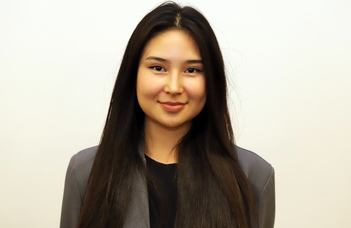Psychology BA

Ukraine

Norway

Pakistan

Morocco

Turkey

Jordan

United Arab Emirates

Kyrgyzstan

Pakistan
Psychology BA
Human Behaviour Analyst
Degree program
Bachelor
OH-FHF/1415-4/2009.
English
6 semesters (3 years)
180
5
150
The aim of the programme is to train professionals in the theoretical foundations and basic methods of psychology and to give insights into the applied branches of the discipline, such as skills and techniques that can be used to measure, explore and develop individuals, groups or organizations. Students will obtain an integrated knowledge of cognitive, affective, developmental, personality and social psychology. It is also aimed to provide modern knowledge and a sense of vocation that support further studies in any psychology MA programme.
The English language psychology program of ELTE has a long history and is an internationally recognized faculty. The programme has existed since 1991. During these years, the Institute has admitted 50-60 students per year from a wide range of countries. The student-to-teacher ratio supports a tutorial-like atmosphere, which can boost communication and the teaching effectiveness. In terms of the number of faculty members and students, professional qualifications, administrative capacity and infrastructural conditions, the Faculty of Education and Psychology at ELTE is among the top 250 Psychology programmes globally, and the best Institute of Psychology in Hungary.
The structure of the program is available on this link.
In line with the programme’s objectives, the curriculum highlights the importance of the theoretical foundations of psychology as a profession. Therefore it includes courses with high credit value on methodology, lectures and seminars about the main subfields of psychology and its applied branches to offer students the skills and competencies required for a behaviour analyst. Apart from the compulsory subjects, we also offer specialised courses that allow students to deepen their knowledge in their fields of interest.
Students participate in research field practices of the four basic subfields of psychology. The BA thesis is prepared as a portfolio of the empirical findings of the research field practice papers, one of which is extended into a full research paper.
The final exam is a defence of the full research paper. Students are required to reflect on their research field practices and their studies in psychology more broadly. They are expected to show evidence of their methodological skills and the appropriate use of statistical methods.
Structure courses
COMMON STUDIES OF COMMON FIELDS, COMMON BRANCH ASSORTMENT, BASIC MODULES
Philosophy of Science and History of Psychology
Study and Communication Skills
Introduction to Psychology
Basics of Research Methods
Biological Psychology 1
Biological Psychology 2
Biological Psychology Practical
Evolutionary Psychology and Behavioral Genetics
Culture and Society
Data Analysis and Statistical Inference
OPTIONAL BASIC SCIENCE STUDIES
Introduction to Bordering Sciences
BASIC SCIENCE STUDIES
Cognitive Psychology 1
Cognitive Psychology 2
Affective Psychology
Research Field Practice in Cognitive/Affective Psychology
Comprehensive Exam in Cognitive/Affective Psychology
Personality Psychology 1.
Personality Psychology 2.
Research Field Practice in Personality Psychology
Comprehensive Exam in Personality Psychology
Developmental Psychology 1
Developmental Psychology 2
Research Field Practice in Developmental Psychology
Comprehensive Exam in Developmental Psychology
Social Psychology 1
Social Psychology 2
Research Field Practice in Social Psychology
Comprehensive Exam in Social Psychology
HISTORY AND APPLICATION OF PSYCHOLOGY
Special Course in Applied Psychology
Psychological Ethics and Legal Issues
BORDERING SCIENCES AND DIFFERENTIATED RESEARCH METHODOLOGY
Introduction to Neuroscience
Research Methods Practical 1.
Research Methods Practical 2
Research Methods Practical 3.
Research Methods Practical 4.
Psychological Skill Training
MAIN FIELDS OF APPLICATION IN PSYCHOLOGY
Introduction to Adult and Child Clinical Psychology
Clinical Psychology Practical
Introduction to Health Psychology
Introduction to Educational Psychology
Introduction to Work and Organisational Psychology
Introduction to Counselling Psychology
Common studies of common fields, common branch assortment, basic modules
- During the course we aim to explore the questions and movements which lead to the development of today’s psychology. We discuss the factors behind the successes and failures of the different historical schoolsof psychology. It is also our aim to study the scientific boundaries of psychology from a philosophy of science point of view
Learning outcome, competences
knowledge:
- The student who fulfils the course will learn about the main approaches of philosophy of science on an introductory level, as well as the development of the history of psychology.
attitude:
- The student who fulfils the course understand the limits of our knowledge.
- The student is open to view the scientific aspects of professional q
...
The aim of the practicum is to acquaint students with requirements of higher education, help develop competencies and study habits necessary for successful achievements in a higher education setting through familiarization with basic theories of learning and communication via individual and small-group activities and self-reflection in the field of communication and learning.
Learning outcome, competences
knowledge:
- knows the typical written, oral, scientific, public, and everyday genres of psychology and their systems of rules;
- has an overall view of the established procedures of the acquisition of texts and cultural phenomena, and of the contexts of
...
The course introduces the students into the field of psychology: to psychology as a profession and as a scientific field. First we take a look at the nature and history of psychology as a science (2 lessons), then overview the basic research fields: subjects, theories and research methods (4 lessons). After that we will investigate some major forms of application (4 lessons), and close the semester with a critical reflection.
Learning outcome, competences
knowledge:
- General, comprehensive knowledge about the main topics in psychology: psychology as a science and as a profession
attitude:
- Openness towards different approaches and contradictions, critical attitude
skills:
- Attention, convergent and divergent thinking, critical thinking, reflexivity
The course of Basics of Research Methods provide the basic knowledge about psychological research related to the main approaches and methods. During the lecture examples and practical exercises help in the transformation of theoretical information into practical competencies. The aim of the course is getting theoretical and practical information related to research planning and the execution of scientific research.
Learning outcome, competences
knowledge:
- about the different theoretical aspects and research traditions, an overview about their aims, similarities and differences
- about the steps of a research planning process
- the possible methods, tools of a study
attitude:
- openness towards the research of different psychological concepts
- sensitivity related to
...
Aim of the course: Inform about the structure and functioning of the human body
Learning outcome, competences
knowledge:
- Structure and functions of different organ systems in the human body.
attitude:
- Scientific approach.
skills:
- Perceive logical relationships about the structure, role and functioning of different organs.
Topics of the course
- Chemical foundations of biology
- Cellular membrane
- Resting and action potentials
- Communication between cells
- Tissues
- Muscle contraction
- Blood
- Circulation
- Respiration
Learning activities, learning methods: the course is a lecture. Preparing for the exam includes
learning the material both in form of text and drawings. Preparing answers to essay questions
requires significant individual work.
Aim of the course: practical tasks concerning diverse physiological functions
Learning outcome, competences
knowledge:
- functioning of certain organs, organ systems
- background of experimental/diagnostic methods
attitude:
- scientific mode of thinking; planning experiments, analyzing and evaluating data
skills:
- experience in computer-based human physiological experiments
- insight into animal behavioral experiments
- analysis, interpretation, presentation of measured dat
Content of the course
Topics of the course
- Investigation of human blood – blood groups, blood glucose level
- Investigation of skeletal muscle function – electromyography, dynamometry
- Investigation of the circulatory system – electrocardiography, blood press
...
Aim of the course: Inform about the regulatory processes of the human body
Learning outcome, competences
knowledge:
- Functions of main regulatory systems in the human body.
attitude:
- Scientific approach.
skills:
- Acquire information about the hormonal and nervous system, be able to see their role in different regulatory functions of the body.
Topics of the course
- Osmoregulation
- Digestion, regulation of metabolism
- Calcium balance
- Structure of the endocrine system, the hypophysis
- Thyroid gland
- Adrenal gland
- Reproductive functions
- Sensory systems - somatosensation
- Motor control
- Auditory and vestibular system
- Chemoreception
- Vision
Learning activities, learning methods: the course is a lecture. Preparing for the exam includes
learning the material both in
...
This course will introduce basic principles and terms and will cover most relevant topics of Evolutionary Psychology and Behavioral Genetics. We aim to develop a scientific attitude
towards the “causes” of various human behaviors and to enhance the ability of students to critically interpret results of related research.
- Students shall learn about the basic principles of evolutionary theory and its applications to psychological phenomena, and develop an understanding of what an evolutionary approach can bring to our knowledge of human behavior and mental processes: that natural selection affects not only morphological features and physiological processes of living beings, but also the nervous system, the brain, and thus mental processes and behavior, even in humans. Evo
...
The course emphasizes the significance of cultural and historical approach in psychological research. It examines the different social psychological processes in historical context: how people’s personality and attitudes shape society and history, and how social context shapes human behaviour. Social psychological theories will be applied to analyse group violence, scape goating, genocide, terrorism, collective memory and political attitudes. Besides presenting concepts and dimensions of culture, it briefly introduces cross-cultural and cultural psychology and gives an insight into those theories which interpret human behaviour and development with a focus on culture. It provides students with culture-awareness and culture sensitivity and calls attention to the inherent impact o
...
Basic science studies
Aim of the course:
To review the most important experimental methods and paradigms of cognitive psychology in
the topics of perception, attention, cognitive control, learning, memory, language, thinking and
problem solving. The presented exparimental paradigms and the tasks are also useful help for
successfully cpmpleting the comprehensive exam.
Learning outcome, competences
knowledge:
- acknowledgeing the genral structure and reason of designing experiments
- introduction to basic experimental paradigms
- undertanding the imponrtance of making experiments
attitude:
- realization of the importance of experimental methods
skills:
- understanding the methodological part of scientific papers
- acquitition of the skill of understanding the visually represented
...
Aim of the course:
This course aims to provide a summary of motivation, emotion and consciousness in a modern,
integrative framework. The course consists of theoretical and practical blocks. The theoretical
lectures cover the classical theories, evidence and methods on the three main topics. In the
practical block, the basic affective processes of healthy adults are demonstrated, analysed and
discussed, on the basis of the self-experience of the students. The practical block also aims to
develop critical, scientific thinking and presentation skills.
Learning outcome, competences
knowledge:
- The student who fulfils this course will know the basic phenomena and the main classical and contemporary theories of affective psychology, including pieces of empirical evidence and
...
Aim of the course:
Basic aims of the field practice:
- Familiarization with the work of the research laboratory that provides the practice
- Attaining practical knowledge on preparing the research plan, conducting data collection and analysis, and documenting and disseminating of the results
- Implementing theoretical knowledge on research methodology and ethics in practice
- Active participation in delivering and solving specific sub-tasks of a specific research project
- Summarizing the experiences and the results in a written paper
Learning outcome, competences
knowledge:
- The student who fulfils the course will learn the research methods and paradigms in specific areas of general psychology (e.g., sensation, perception, cognition, consciousness, emotions, motivation, pain,
...
Aim of the course:
The main objective of the course is to give an overview on the theoretical frames of affective
cognitive psychology, with it’s basic concepts.
Learning outcome, competences
knowledge:
- Basic concepts of affective and cognitive psychology
- Theories of emotions, perception, memory, thinking and motivation, including current research trends and their outputs
- Relations of affective and cognitive mechanisms and their malfunctioning
attitude:
- Ability to understand and ask questions in relation to the functioning of mind,
- Utilisation of knowledge in scientific communication, presentation
skills:
- Skills af applying main methods
- Skills of identifying a nd segmenting basic psychological mechanisms
Topics
1. Basic concepts of perception
sensation and
...
The general aim of this two-semester course (Personality I. and II.) is to introduce students to the different approaches, perspectives or strategies of the study of personality. The Personality psychology I. course is organized around the dispositional and cognitive perspectives, i.e. the biological, social-learning and cognitive approaches to individual differences and personality
structure.
Learning outcome, competences
knowledge:
- the most important terms and theories about the trait and motivational based dispositions, their biological and social-learning and cognitive explanations
- the criticism of the trait concept by the theoretical and empirical questioning of the behavior consistency, and the solution of the problem by the cognitive-interactionist approach
- the
...
Aim of the course:
Personality Psychology 2 focuses on different personality theories that describe the structure, the
emergence, the development and the dynamics of personality. The representations of these
aspects in forms of healthy and pathological functions are also examined. The main emphasis is
on the following approaches: 1. psychoanalysis, 2. neoanalytical perspective, 3. humanistic
psychology, 4. cognitive perspective and self-regulation. We present the basic assumptions of the
different approaches, the way of thinking of theoreticians, the preferred methods of
measurement, as well as basic concepts and therapeutic aspects of psychopathology.
Learning outcome, competences
knowledge:
- the basic concepts of psychoanalysis, the neoanalytical perspective, learning
...
Aim of the course:
The aim of the course is to provide a practical insight to the actual process of the research of
personality psychological phenomena by completing a partial tasks in a guided research. Students
can participate in four partial tasks, thus they can gain practical experience in the following:
1. Literature summary
2. Activitiy connected to empiric data collection
3. Activitiy connected to data processing
4. Making a presentation or a poster
Learning outcome, competences
knowledge, depending on the completed partial task:
1. Literature summary
- The student knows the major databases dealing with personality psychological phenomena
- The student knows the rules of systemic search for literature
2. Activity connected to empiric data collection
- The student
...
The comprehensive exam requires an integrative, as well as analytical knowledge on the topics of the courses of Personality Psychology I. and II. This exam covers the questions concerning the structure, the growth and development, and the dynamics of personality, i. e. the dispositional (trait and motive) and interactional approaches to personality description, the biological, sociallearning, psychoanalytical, phenomenological, and cognitive approaches to individual differences and functioning of personality. The issues concerning the healthy and pathological functioning of personality are also included. The list of topics is accessible from the first semester including personality psychology.
Learning outcomes and competencies
Knowledge:
- the descriptive models, and
...
This course is an introduction to developmental psychology focusing on cognitive development
in the period between conception and puberty. The course – that consists of lectures and
seminars requiring regular attendance – aims:
1) to help to understand the fundamental approaches and theories in developmental psychology
and their significance in practice
2) to give an introduction to the specific issues of research on cognitive development and
measuring the individual achievement in cognitive functioning – understanding illustrative
examples from classical and contemporary research and gaining experience in testing young
children
3) to review the most important milestones of cognitive development both in thematic and
chronological approach
Learning outcome, competences
kn
...
Aim of the course:
The course provides an introduction to socialisation across the life span. The topics cover the
major classical and modern theories and research approaches, bonding and attachment, self and
identity, development of gender roles, social competence, peer relationships, moral development,
parenting styles.
The seminar discussions are based on both compulsory and individually selected readings.
Practical assignments include work in groups, student presentations.
Learning outcome, competences
knowledge:
- know about approaches to the socialization process
- research methods and results of projects
- the international literature and the latest trends and results
attitude:
- open attitude to socialization strategies and their results
skills:
- be able to
...
Aim of the course:
The aim of the course of „Research Paper in Developmental Psychology” is to participate in a
research with ethical permission using and deepening previously obtained knowledge of
developmental psychology and research methods and to write a small research paper.
Learning outcome, competences
knowledge:
- To know how the developmental psychological theories can be incorporated into a research plan, to construct a research plan
- To know the practical issues of developmental psychological research: to participate in elaboration of developmental psychological literature and/or collecting data and/or statistically analyzing developmental psychological data and/or interpreting data, discussing the findings
- To know the rules of publishing developmental psy
...
Aim of the course:
The comprehensive exam tests the students’ integrated knowledge regarding the course of
Developmental Psychology 1 and 2. A topic list – including the issues processed in the course of
Developmental Psychology 1 and 2 – is available in the semester including Developmental
Psychology 1.
Learning outcome, competences
knowledge:
- knowledge acquired in Developmental Psychology 1 and 2
attitude:
- to integrate knowledge acquired in Developmental Psychology 1 and 2
skills:
- to prepare and represent the topic
- to answer related questions
Topics of the course
- Developmental Psychology 1: Cognitive development
- Developmental Psychology 2: Socialization
Aim of the course:
The first part of the course provides an introduction to the history, the main topics and the
methods of social psychology, then it proceeds to a detailed discussion of social psychological
knowledge, following the structure of intra-individual-, interpersonal-, intragroup- and
intergroup-level phenomena. Of these, Social Psychology 1. concentrates on the intra-individual
level, discussing social cognition and the cognitive approach in social psychology. Students shall
learn about social psychological phenomena from social perception (including attributions,
impression formation, stereotypes and prejudice) to social aspects of the self (including the selfconcept
and self-esteem) to attitudes (including their origins and functions as well as their change
due to
...
Aim of the course:
The course continues to present the basic principles of social psychology by discussing topics
related to social behavior on (1) an interpersonal level, such as intimate relationships, helping,
and aggression; (2) group level processes, such as group formation and dynamics, decisionmaking
in groups and questions of leadership. Finally, the course discusses social
psychological questions about (3) intergroup relations, intergroup conflict and conflict
resolution. The topics are introduced by offering an overview of social psychological research
in these particular interpersonal, group level and intergroup topics, discussing classical
theories as well as the newest developments in the field. Broader societal implications and
applied aspects of the topics are
...
Aim of the course:
The main goal of the course is to put theory into practice: students are
required to conduct an empirical research (or part of it).
Major research paper: Students are required to complete a small empirical study on an issue
relevant to social psychology and to present it in a research paper (introduction based on the
literature, questions and hypotheses, method, results, discussion, maximum 15 pages and it has
to be minimum 8 pages without references and appendices, single spaced, 1 inch margins). It is
an independent work under the supervision of the instructor, but the topic of the research and
data collection can be connected to the ongoing empirical research projects of the instructor.
A Minor Research Skills Paper offers students the opportunity to gain
...
Aim of the course: the exam gives a chance to summarize the content of previous courses in
social psychology (Social Psychology 1-2, Lecture and Practical)
Learning outcome, competences
knowledge:
- Demonstrate a structured knowledge of the most important terms and theories of social psychology
- Solid understanding and critical examination of research methods used in social psychology
attitude:
- Able to restructure previous knowledge from a different perspective
- Sensitive to perceive social psychological phenomena and problems
skills:
- Able to communicate in an effective and convincing way
- Approaches the literature of social psychology from a methodological perspective
Topics of the course
TOPICS A
1. Foundations of social psychology: principles, methodological
...
The main objective of the course is to give an overview on the theoretical frames of cognitive psychology, with it’s basic concepts. As cognitive processes serve as basics for all human behavior, also it’s problems influence wellbeing and social relations, especially important to deliver a comprehensive overview for students.
Learning outcome, competences
knowledge:
- Basic concepts of cognitive psychology
- Theories of perception, memory and thinking, including current research trends and their outputs
- Relations of cognitive mechanisms and their malfunctioning
attitude:
- Ability to understand and ask questions in relation to the functioning of mind,
- Utilisation of knowledge in scientific communication, presentation
skills:
- Skills af applying main met
...
History and application of psychology
The aim of the course
The aim of the course is to provide insight into the areas of applied psychology. The course gives
insight in the different fields of applied psychology, furthermore discuss ethical, methodological
issues, practical applications and develop some practical skills as well. It provides a
comprehensive knowledge related to an area, a detailed view of practical aspects, therefore
students will be able to identify what kind of competences are needed for being practitioner. At
the same time the course prepares other courses which present some well-defined area of
psychology such as: adult and child clinical psychology, health psychology, work and
organisational psychology, counseling psychology, to educational psychology. The course offers
a number of options,
...
The purpose of the course is to provide a general philosophy and ethical guidance to cover all situations encountered by professional psychologists. The evolution of moral behaviours, history of professional psychologists’ ethical codes, fundamental ethical principles of psychologists, relationship between legal and ethical issues, and evaluative procedures and corrective actions in case of complaints about unethical conduct will be covered by lectures, problems and dilemmas emerging in the practical application of professional ethics will be discussed in seminars.
Learning outcome, competences
knowledge:
- has appropriate knowledge in the main fields of psychological ethics
- knows the most important expressions and phenomena of psychologica ethics and the fundamental t
...
Bordering sciences and differentiated research methodology
Aim of the course:
The main objective of the course is to give an overview on the basic methods, shared disciplinary
concepts and current theoretical models of Neuroscience, as a timely and developing
mulidisciplinary approach in understanding our brain.
Learning outcome, competences
knowledge:
- Psychopysiological, Neuroscience and Neuroanatomy concepts
- Current methods and main objectives in Neuroscience
- Basics in Neuroanatomy
attitude:
- Utilisation of knowledge in scientific communication, presentation
skills:
- Skills af applying main methods
- Skills of identifying related neurological and neuroanatomical structures of psychological functions
Content of the course ...
Topics of the course
In modular structure, covering the following fields of research
The course of Research Methods Practical I. aims to give information about survey techniques, tests and questionnaires in psychological research. The focus is on the methodological characteristics of the tools, the basic concepts of psychometrics and some practical aspects.
Learning outcome, competences
knowledge:
- about steps of a research planning procedure
- about the criteria of choosing different questionnaires and tests
- about the possible instruments of survey studies
attitude:
- openness towards the research of different psychological concepts
- sensitivity related to the research problems of psychology
- ethical sensitivity related to the psychological research
skills:
- can plan a psychological study until the step of the ethical approval
- can work in a
...
The course will provide an overview as to what has led to the rise of qualitative research, examine the influence of other disciplines’ research methodology and the current place of qualitative research in psychology. In practical terms, we will analyse what can constitute qualitative data, how qualitative data can be processed, and how can qualitative research results be linked to quantitative research. At the seminars, students will learn about key qualitative research methods (interviews, focus groups, content analysis, observation, field study). The aim is that through practical tasks students can acquire competences which will enable them to put these methods to use: to realize which questions can be answered with the help of this method, to plan a qualitative i
...
Research Methods Practical 3 includes two optional courses: “Neuropsychology and Performance Measurement” and “Opinion Measurement”
I. Opinion Measurement
During the course, students get acquainted with the most important methods of opinion research with a special emphasis on the most effective methodological solutions for explicit and implicit attitude measurement. Both direct and indirect methods are presented and practiced. Participants of the course gain knowledge about how to handle an attitude either as a dependent or as an independent variable in a study. Our main goal is to provide our students with the skills and confidence to utilize their theoretical knowledge regarding attitudes and opinions in practice as well.
Learning outcome, competences
know
...
The aim of the course is to acquint students with the methods and principles of scientific experimentation in psychology. Students will become able to formulate testabe hypotheses and select the appropriate methods for conducting experiments and analyzing data. They will also learn to critically evaluate research methods and alternative interpretations of results.
Learning outcome, competences
knowledge:
- formulating testabe hypotheses and select the appropriate methods for conducting experiments and analyzing data
attitude:
- a competecy in experimental research method, analytic attitude
skills:
- critical evaluation of research methods and alternative interpretations of results
Content of the course
Topics of the course
1. Introduction – the basic principles of e
...
The aim of the course
The aim of the course is to give theoretical knowledge and practical skills for professional
interpretation of human behaviour. This course aims to present models, research methodologies
and measurement techniques, giving possibilities to own experiences as well. Psychological
models and theories offer indicators for studying human behaviour, therefore in this course
students will learn about measurement, diagnostic tools, techniques, prevention and intervention
opportunities. Depending on the topics of chosen courses students will have opportunities for
gaining own experience, to conduct research, to carry out measurements and interpretation of
data, to try different techniques for developing human resources, techniques of trainings and
therapies.
...
Optional basic science studies
The main aim of the course is to form the scientific attitude and approach of students via co-sciences of psychology (cultural anthropology, economics, sociology and communication and media science). The classes are held by famous experts of the given science who will equally share the most important basic knowledge of their specialization and connect these knowledges to psychological competencies.
Learning outcome, competences
knowledge:
- Knowledge of basic concepts, knowledges, theories and specific methods of cultural anthropology, sociology, economics and communication and media science
attitude:
- Increased social scientific sensibility, susceptible approach, flexible thinking
skills:
- Ability to connect the knowledge and approach of psychology to basic
...
Main fields of application in psychology
Aim of the course:
The main goal of this course is to provide insight into the theoretical background, applications
and practice of clinical psychology. An overview of the mental disorders, their symptomatology,
epidemiology, etiology, diagnosis and special needs during therapy are provided. This course
shows equally mental and behavioral disorders in adulthood, childhood and adolescents. In
addition, aim of this course is to introduce to cultural and historical aspects of mental disorders
and to show the diagnostic systems. The theoretical knowledge is complemented by clinical
practice where the students can know competencies for clinical psychology.
Learning outcome, competences
knowledge:
An overview of the mental disorders, their symptomatology, epidemiology, etiology,
...
Aim of the course:
The main goal of this course is to provide insight into the practice of clinical psychology. Students
acquire the basic skills needed for the first encounter and communication with patients. Based
on the theoretical knowledge of characteristics of mental disorders students are able to explore a
patient with mental disorder and they are able to summarize their experiences. Practical
information regarding the aims of a first psychological interview in clinical practice, special
problems that could occur during an interview, and possible solutions are discussed using role
plays and other exercises.
Learning outcome, competences
knowledge:
- characteristics, diagnostic and psychotherapeutic aspects of main mental and behavioral disorders
- person-centered
...
Aim of the course:
The global aim of the course is to provide students with basic but broad knowledge, skills and a
perspective from health psychology.
Learning outcome, competences:
You will acquire knowledge about:
- Various topics within the field of health psychology (see overview below).
- The diverse approaches from health psychology.
- The complexity of health and diseases including different approaches to health, well being and flourishing.
- Links between health psychology and other health sciences.
Attitude:
- Students will acquire a perspective from health-psychology, taking into account the complex interplay between one's physical well being and a variety of biological, psychological, and social factors.
Skills:
- Students will discover how psychological methods
...
Aim of the course:
….is to describe the process of education as a socialization process equally emphasizing parentchild
and teacher-student relationships, and in line with ecological approaches provide
description of interactions among processes at society, family and educational institution levels,
so as students can identify the processes described in theories as they surface in the applied field.
As a part of discussing educational models, psychological theories and their impact on teaching
methods, the organizational aspects of educational institutions and on peer-relations among
students are also be identified so that students will be able to identify possible causes of problem
situations. To heighten awareness of social norms and standards of behavior towards persons
...
The aim of this course it to give an overview of the fields and methods of work and organisational psychology. The aim of this course is to present the main tasks of work and organisation psychologists performed inside and outside of the organisations. The specific goal of this course is to present the main topics of this domain and to integrate this knowledge into everyday
practices.
Learning outcome, competences
knowledge:
- Students will be familiar with models and theories behind the main domains of work- and organisational psychology
- Students will be able to connect their psychological knowledge with the more specific goals of this domain
attitude:
- Students will show openness, sensibility to specific problems of different type of organisations
- Students will be
...
Aim of the course
The aim of the course is to provide the students with the basic concepts and historical
background to counselling psychology. As an evidence based service, counselling psychology is
based on international scientific and professional paradigms that are to be Introduced through
the course.
We will give insight into the microskill approach of counselling. Systems thinking and group
counselling, as well as family therapies are Introduced through the classes.
The course also serves as an introduction to apllied psychological approaches in the field of nonclinical
helping and crisis intervention.
Learning outcome, competences
knowledge:
- The basic concepts and historical background of counselling psychology
- The basic skills and competences of counselling
...
A behaviour analyst can carry out activities that support the work of a qualified psychologist in organisations and institutions providing education, training, development, re-education, correction, treatment and rehabilitation. Furthermore, a behaviour analyst can also work in any psychological laboratory and complete and evaluate several standard experiments and aptitude tests of organisational psychology. In specific cases, however, the supervision of a qualified psychologist is necessary. A behaviour analyst is trained and prepared to conduct and analyse several studies regarding human interventions, such as standard or intentional survey of competence, adaptivity, attitude or functioning; the demand for such professionals is high in any country of the world. Institutes that already employ a well-trained and qualified psychologist can also claim professionals to work under supervision and deepen their competence this way. Thus, the human resources and financial budgets might get better organized and become more productive whilst remaining cost effective – benefiting both employers and employees.
- Behaviour analyst
- HR assistant
- Research assistant
4,700 EUR
4,700 EUR
120 EUR (non-refundable)
120 EUR (non-refundable)
-
-
Entrance exam fee: 120 EUR (non-refundable)
Entrance exam fee: 120 EUR (non-refundable)
4,700 EUR
120 EUR (non-refundable)
-
Entrance exam fee: 120 EUR (non-refundable)
Yes
01, Sep, 2025
25, Jun, 2025
No
Entry requirements
The students who can apply for a BA in Psychology programme for the 2025/2026 academic year, are expected to present the documentation of their certificate of matriculation from a secondary school and to submit their application with the necessary attachments.
The university only accepts certificates, which are equivalent to the Hungarian certificate of matriculation, thus appropriate for continuing one’s studies in university education. If the certificate is not in English, the university needs an official translation, which could be a translation by the secondary school as well.
If the applicant completes their secondary education during the current term and their certificate is not issued before the application deadline a proof of student status / a certification which verifies that the applicant will receive matriculation is required instead. In case of being accepted as a student, however, the applicant must present their certificate of matriculation upon enrolment at the latest.
This programme is not available for Hungarian citizens.
The educational and outcome requirements are defined by the Ministry of Human Capacities (Regulation No. 18/2016. (VIII. 5.)). The details of the application and admission process are defined by the Organisational and Operational Regulations of ELTE.
Language requirements
Minimum level of language proficiency (oral) (A1-C2): B2
Minimum level of language proficiency (written) (A1-C2): B2
Further comments:
The language of instruction for the entire programme is English, so a very good command of English is required during the oral entrance exam and throughout the whole programme. The language knowledge is assessed and evaluated during the interview, the Faculty of Education and Psychology doesn't require an official language certificate.
| Document | Comment |
| Online application form | - |
| Record of the final two years in secondary school | - |
| Secondary school certificate | - |
| CV | - |
| Motivation letter | The letter should contain approximately 2000 characters. You should explain your experiences and ideas, how you met psychology and why you think this profession would be suitable for you, what your aim is with the psychology degree, how you would imagine your career, which area you are interested in, what further studies you are planning. |
| Copy of the main pages of the passport (needs to be valid) | needs to be valid |
| Copy of application fee transfer | - |
| Entrance exam fee | - |
| An official English translation of the certificates and the records if the language of the original is not English | - |
The university only accepts certificates, which are equivalent to the Hungarian certificate of matriculation, thus appropriate for continuing one’s studies in university education. If the certificate is not in English, the university needs an official translation, which could be a translation by the secondary school as well.
If the applicant completes their secondary education during the current term and their certificate is not issued before the application deadline, a proof of student status / a certification which verifies that the applicant will receive matriculation is required instead. In case of being accepted as a student, however, the applicant must present their certificate of matriculation upon enrolment at the latest.
The application starts in the online application system. Students need to register in the system, fill in the online application form, upload the required documents and follow the instructions during the application process.
The application and the entrance exam fee should be transferred to the following account:
- Name of Bank: Magyar Államkincstár (Hungarian State Treasury)
- Address of Bank: Budapest, Váci út 71, Hungary – 1139
- Holder of the account: Eötvös Loránd Tudományegyetem
- Account No.: 10032000-01426201-00000000
- SWIFT Code: HUSTHUHB
- IBAN Number: HU03 1003 2000 0142 6201 0000 0000
- On the transfer order please put down your full name and “AB01 B106 AB9P01/04”!
The deadline for application means the deadline of submission of the full and complete application package in the online system.
The application procedure includes 5 periods in order to give the applicants the freedom to submit their application when it’s most suitable for them. The applicants of each period have the same chance to get admittance for the programme. However, please note, that the Faculty of Education and Psychology ELTE reserves the right to cancel the entrance periods in case the number of the admitted applicants reaches the limit during the previous entrance periods.
- Period 1: 25 February
- Period 2: 25 March
- Period 3: 25 April
- Period 4: 27 May
- Period 5: 10 July
When the university receives the full application package and it is checked by the Student Affairs and Registrar’s Office an entrance exam date option will be sent in the online application system after the application deadline for the relevant period. Please, check your messages in the application system, and the e-mail address that is linked to the account regularly.
Procedure of the entrance examination
The applications are examined by the Admission Board and applicants are notified of the outcome of the selection in the online application system after the decision is official. Admission letters are sent out in the online application system.
Type of entrance examination: oral
Place of entrance examination:in person or online. (Via MS Teams)
Entrance examination and selection process
The applicant receives a popular psychology-related magazine article and has one hour to read it before the oral examination begins. In the oral examination, the applicant should discuss the article with the examiners, and is expected to be able to summarize the main points of the article and reply to related questions. The committee assesses whether the applicant has the adequate vocabulary to understand the topic and skills to analyse the text. Notes can be taken during the preparation (i.e., while reading the article) and used during the discussion. In the second part of the interview, the applicant has the opportunity to share their background and express their motivation. The entrance examination can be taken in person or online via Teams. (For that, it is not necessary to download the app).
Results and the official decision will be announced within a month after the entrance exam date in the application system. The ranking is based on a total evaluation of the academic excellence (based on the submitted documents) and the results of the entrance exam.
Orhidea KISS
Associate Professor, Deputy Director of Institute of Psycholgy
Violetta FRANK
International Admission Coordinator
E-mail: admission@ppk.elte.hu
TEL: +36 1 461 4500 / 3499
Postal address: 1075 Budapest, Kazinczy utca 23-27.
More information
Faculty of Education and Psychology
Faculty of Education and Psychology
Campus Tour Join our student guide, Peter Enim (PhD student at the Doctoral School of Psychology) for a tour at the Faculty of Education and Psychology, Eötvös Loránd University (ELTE), Budapest, Hungary.
Campus Tour Join our student guide, Peter Enim (PhD student at the Doctoral School of Psychology) for a tour at the Faculty of Education and Psychology, Eötvös Loránd University (ELTE), Budapest, Hungary.
0
/
0










0
/
0






